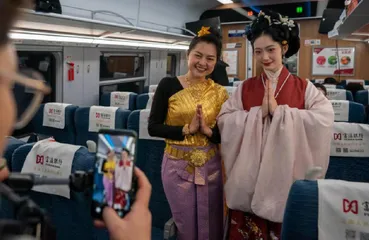The Cultural Gene and Historical Experience of China’s Peaceful Development
作者: Peng Zongchao Lu Lu

The Western society pays close attention to China’s development, draws supposed commonalities between China and the emerging powers that have competed for international power in history, and uses the “Thucydides Trap” to continuously amplify the “threat” posed by the growth of China’s national strength. This point of view is based on the historical practice of Western countries that take competition as the supreme value and stems from the Western logic that “a strong country will seek hegemony”. However, the core fallacy of applying such stereotypes to China’s development lies in the lack of a genuine understanding of China’s cultural traditions and historical practices. The thought of peaceful development is the inherent gene of the Chinese culture. China’s gene for peace refers to the ideological, cultural and historical tradition that has been passed down from generation to generation by the Chinese nation to deal with interpersonal, social and international relations based on the principles of “harmony and peace the most precious”, “harmony in diversity”, and “peace, concord and harmony”, including the corresponding beliefs, principles, values and historical practices. Excavating and interpreting China’s peaceful gene will not only help clarify the misunderstanding and prejudice of Western countries toward China’s development in order to refute the “China Threat Theory” and the “Thucydides Trap” but also help strengthen our historical and cultural consciousness of unswervingly following the path of peaceful development.
The Cultural Gene of China’s Peaceful Development: “Harmony and Cooperation Culture”
“Harmony and cooperation” is the core concept of the Chinese traditional philosophy and culture. The idea of “harmony and cooperation” in the Chinese traditional culture first pursues the value of “harmony”, that is, “In practicing the rules of propriety, a natural ease is to be prized.” This means the proper and harmony is precious. The second pursuit is to emphasize harmony in diversity. “The superior man is affable, but not adulatory” That is, we should respect objective differences and seek an ideal way to maintain the independence of each subject while giving full play to their respective strengths and integrating symbiosis. Finally, we should pay attention to “peace, concord and harmony”, which ranges from self-cultivation to social relations, national governance and international relations.
In dealing with interpersonal relations, the Chinese people advocate “concord”. The Chinese people are accustomed to “concord”, or friendly interpersonal interaction. The pursuit of harmony and the avoidance of conflict have become inherent characteristics rooted in Chinese culture. “Now the man of perfect virtue, wishing to be established himself, seeks also to establish others; wishing to be enlarged himself, he seeks also to enlarge others.” The Chinese people follow the lenient and harmonious way of life that encourages one to put others before oneself and strive to create an interpersonal harmonious environment. The Chinese people also advocate humility and peace. The historical legends of the Boyi giving up the kingship to his brother Shuqi in the Shang dynasty; and the story of 6 Meters Lane, in which Prime Minister Zhang Ying suggested that mother, who still lived in their hometown, to concede 3 meters to reconcile a homestead border dispute with her neighbor, after which her neighbor also conceded 3 meters, forming a 6 Meters Lane between the two houses in the Qing dynasty, all reflect the Chinese people’s time-honored spirit of comity and seeking peace since ancient times.
In dealing with social relations, the Chinese culture advocates “harmony”. “He was able to make the able and virtuous distinguished, and thence proceeded to the love of the nine classes of his kindred, who all became harmonious. He also regulated and polished the people of his domain, who all became brightly intelligent. Finally, he united and harmonized the myriad States of the empire; and lo! The black-haired people were transformed. The result was universal concord.” That is, first, we should manage our family well so that we can love each other and live in harmony; then, we should pursue the comfort of the people, the stability and harmony of the society, and the peace of all nations. “Harmony” guides the social cooperation relations of different stakeholders in the country. “There are the rectification of the people’s virtue, the conveniences of life, and the securing abundant means of sustentation, these must be harmoniously attended to.” The country adheres to righteousness, utilization, welfare, and harmony so that virtue and benevolent government can benefit more people.
In dealing with international relations, the Chinese nation pursues “peace”. Since ancient times, China has advocated such concept as: “If the people of the world all love each other, the strong would not dominate the weak, the many would not plunder the few, the rich would not despise the poor, the noble would not scorn the lowly, and the cunning would not deceive the foolish”. It has put forward the admonition that a big but warlike country will surely perish itself. “Thus, even though a state must be vast, those who love warfare will inevitably perish. Even though calm may prevail under Heaven, those who forget warfare will certainly be endangered.” The Chinese nation has handed down reflections on peace from generation to generation, such as turning hostility into friendship. “In ancient times, Emperor Kun of Hsia built a towering wall; but the Lords rebelled and the distant people became suspicious and wily. And so Yu, seeing the opposition of the kingdoms, erased this wall to the ground and filled in the moats, scattered the wealth accumulated, burnt the implements of war and administered the empire on the principles of virtue, not of force. As a result, the distant people brought their tributes and the barbarian tribes their offerings. The concord sealed at the conclave of the Lords, at T’u Shan, resulted in valuable tributes from myriad kingdoms.” “Under heaven the great harmonious society”.